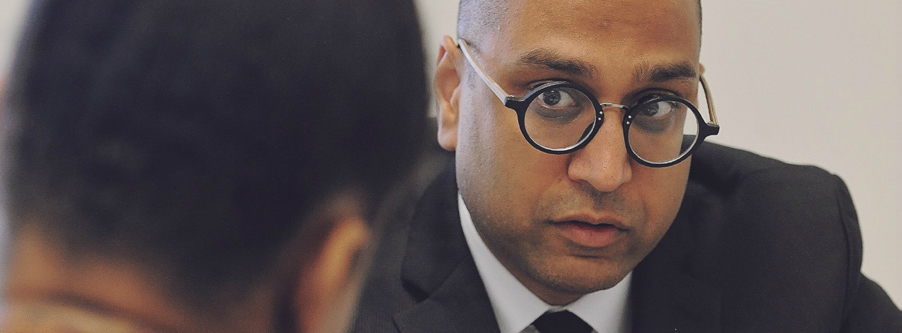Political science alum's nonprofit brings legal services to the homeless

Jayesh Patel's favorite mantra is "life is better in flip-flops," but as a lawyer, he sometimes has to compromise and put on shoes. And while flip-flops may not be appropriate in the courtroom, when your court is on the streets, sporting sneakers is not only acceptable, but also a smart move.
Patel is the founder of Street Democracy, a legal services nonprofit organization that focuses on aiding the impoverished and homeless. On any given day, Patel, who is also a private practice attorney, can be found meeting clients at Detroit soup kitchens, at shelters or in court, helping them understand the legal system and earn a chance for rehabilitation.
Patel received a bachelor's in political science at Wayne State in 1996 before completing law school at Georgetown University. After working at a nonprofit in Washington, D.C., that aided prisoners returning to their communities, he came back to the streets of his hometown with one goal in mind: Make an impact in ending the criminalization of poverty.
"I've always been interested in social justice. In this day and age of the million-dollar defense, I began asking, 'What if everybody got the same level of service?' and that's how Street Democracy was born," Patel explains. "But we also realized that without addressing the underlying causes of poverty and homelessness, we would only be performing legal triage."
Street Democracy's first initiative was modeled after a homeless court run by Judge Elizabeth Hines in Ann Arbor, Michigan. In lieu of money, defendants who were identified as homeless were offered alternative methods of restitution, including counseling, job training, education and volunteer service. In 2011, Patel and his team were observing the court and formulating a plan to bring the model to Detroit when they learned that Detroit Action Commonwealth, a nonprofit membership organization of homeless persons, was also watching and interested in the same goal.
Judge Hines introduced the two groups to each other and to judges Cylenthia LaToye Miller and Katherine Hansen of Detroit's 36th District Court. The two judges welcomed Street Democracy, Detroit Action Commonwealth, and other public and private agency partners including the Wayne County Sheriff 's Office, Wayne County Prosecutor's Office, Capuchin Soup Kitchen and Neighborhood Legal Services Michigan to establish Street Outreach Court Detroit (SOCD). With Street Democracy focusing on the legal framework, drafting court guidelines and creating a network of pro bono counsel, SOCD became the 23rd homeless court in the United States. According to the Street Democracy website, it may be the only court that combines criminal and civil pro bono counsel to address legal matters outside of the court's jurisdiction while also tracking the long-term success rate of its participants.
The results speak for themselves. Patel and his team literally take the court to the streets meeting clients at soup kitchens and shelters. They work with clients to reduce and resolve civil infractions and misdemeanors by demonstrating a personal effort to improve their own lives. With a team of legal and social service professionals, clients create an individual action plan designed to end their homelessness. After 30 days of demonstrated progress, they may apply for SOCD relief to suspend any outstanding warrants and are granted time to complete their action plan. The final step is an SOCD hearing, where relief is determined by the court.
"Instead of using crime as a punishment, we use it as an inflection point to change the trajectory," says Patel. "When someone is identified as homeless, making them pay hundreds of dollars in fines is not aiding in breaking the poverty cycle. That only begins to occur when you address the causes, the root of homelessness. When they sign up for counseling, enroll in job training and regularly volunteer in their community, they are creating new networks, bettering themselves and positively impacting the people around them."
Six months after graduating from the program, 97 percent of participants had stable housing, 91 percent had stable income and 100 percent had no new misdemeanor or felony charges. The court continues today, and Patel estimates it has saved taxpayers thousands of dollars and reduced crime rates over the course of its existence.
The impact made its way throughout the legal community and caught the attention of Judge Alexis G. Krot in the Michigan 31st District Court in Hamtramck. With a different perspective from the bench, Krot asked Patel, "What if we flipped the model on its head?" While SOCD focused on what a judge can do during sentencing, the two began to explore what the impact would be during arraignment. The pilot project, Functional Sentencing, began earlier this year, and the judge likes what she sees.
"With the Michigan Indigent Defense Commission requiring better representation and integration, I immediately thought of Jayesh and Street Democracy, and we have been very impressed not only with the way they came in and organized the process but with the real progress we see in individuals," Krot says. "Although it is a pilot, I am hopeful that it can be replicated more people get representation and they understand their rights better. It's a step in the right direction to breaking the cycle of recidivism."
By Annessa Morley
This story originally appeared in the fall 2017 issue of Wayne State Magazine. Photo credit: David Dalton